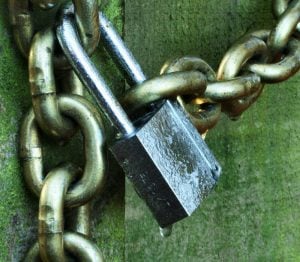There was once a time when a bitcoin was worth about as much as the spare change down the back of your sofa. Now, one bitcoin is worth your sofa, your armchair, and every other item of furniture in your living room. Gone are the days when maintaining military grade opsec was the preserve of bitcoin whales and the ultra-paranoid. As digital currencies soar, safeguarding your cryptocurrency is imperative, no matter how humble your holdings. Here’s how.
Lock it Down and Hold it Down

Lock it down: Keep your crypto assets in a secure wallet which you possess the private keys for. That way you and you alone are responsible for what happens to your coins.
Hold it down: By all means preach the gospel of Satoshi and decentralization from the rooftops, but as we recently reiterated, keep your bitcoin holdings to yourself. Five years ago, no one would bat an eyelid at hearing you owned 100 BTC. Do that today and you risk attracting the sort of ne’er-do-wells that are lured to wealth in all its forms.
Choose Your Wallet
There are two primary means of storing your bitcoins and other cryptocurrencies: in a wallet which you hold the private keys to, or in an exchange which holds the keys on your behalf. Hardware wallets such as Trezor and Ledger as well as mobile apps such as Bread all fall into the former category. Provided you write down your private key and seed (a 12-word recovery phrase), your coins will be safe, even if you accidentally delete the app or break the hardware wallet.
Keeping your coins in a cryptocurrency exchange or a site such as Localbitcoins, on the other hand, offers convenience, especially for day traders buying and selling cryptocurrencies. This convenience comes at the price of safety however. If the exchange was to collapse or be hacked, there is a possibility you could lose your holdings. It’s happened in the past and will happen again.
Use Strong and Unique Passwords
Passwords are used in 63% of all successful cyber attacks. Deploying passwords that are guessable, or worse still recycling the same password, will significantly increase your odds of getting owned. Don’t get lazy or take shortcuts when it comes to passwords – it’s simply not worth it. If you don’t trust your ability to recall passwords, use a password manager such as LastPass.
2FA Everything
Don’t Click That Link
Final Reminders
With one millibit – or 1/1000th of a bitcoin – now worth more than $10, every wallet, no matter how slender its BTC, is a target. Keep the extent of your bitcoin holdings to yourself, separate your real world identity from your online one, and if you’re unsure don’t click that link. The bitcoin world is filled with amazing people, but like any high value commodity, it also attracts thieves, scoundrels, and scavengers. Protect your assets, up your opsec, and then kick back and enjoy the ride.
What security tips would you give to bitcoin newcomers? Let us know in the comments section below.
Images courtesy of Shutterstock, and Trezor.